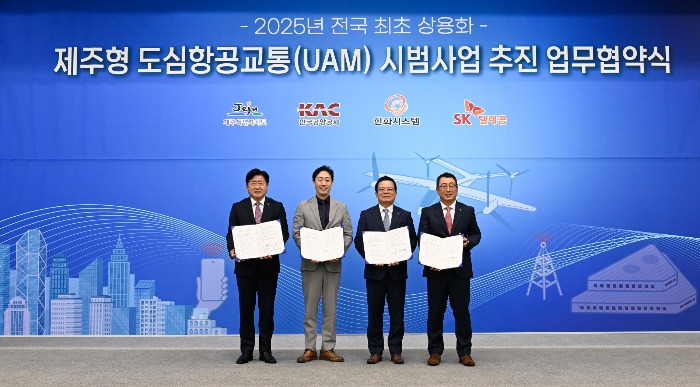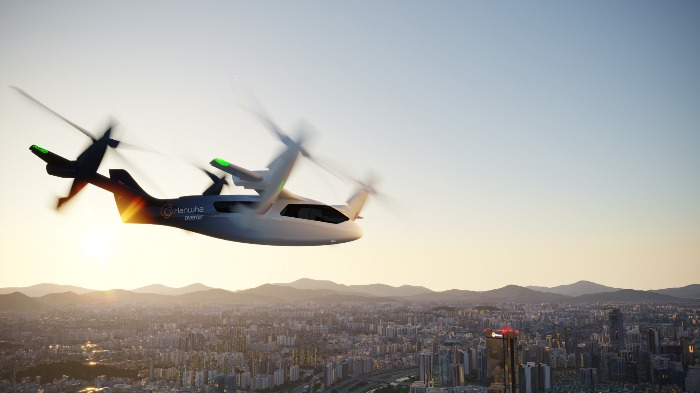SK Telecom-led consortium to commercialize air taxis on Jeju Island
K-UAM Dream Team consortium signed an agreement with the Jeju government to collaborate on a pilot urban air mobility program
By Sep 14, 2022 (Gmt+09:00)
Alibaba eyes 1st investment in Korean e-commerce platform


Blackstone signs over $1 bn deal with MBK for 1st exit in Korea


NPS loses $1.2 bn in local stocks in Q1 on weak battery shares


OCI to invest up to $1.5 bn in MalaysiaŌĆÖs polysilicon plant


Korea's Lotte Insurance put on market for around $1.5 bn



Come 2025, visitors to South KoreaŌĆÖs resort island of Jeju will be able to hail air taxis while there ŌĆō thanks to special air routes dedicated to tourists.┬Ā
Wireless telecommunications operator SK Telecom Co. announced on Wednesday that a consortium it leads signed an agreement with the islandŌĆÖs local government to collaborate on a pilot program for urban air mobility (UAM).┬Ā
The Korea Urban Air Mobility (K-UAM) Dream Team consortium was led by SK Telecom and joined by Hanwha Systems Co. and Korea Airports Corp. In April, the Korea Transport Institute and Korea Meteorological Institute also joined.┬Ā
The consortium plans to build takeoff and landing strips for air taxis, known as vertiports, and establish a traffic control system specific to air mobility.┬Ā
The initial plan is to gain as much experience on the island with the ultimate goal of managing air taxi operations in busier mainland cities.┬Ā
The consortium explained that Jeju Island is the ideal UAM testing ground due to the ample influx of tourists and a stable operating environment.┬Ā

TEAM EFFORT
SK Telecom will service the air taxis, develop and operate a mobility platform, and manage a communication system for air mobility.┬Ā
In February, the wireless carrier signed a strategic partnership with California-based Joby Aviation, an aircraft startup developing an electric vertical takeoff and landing aircraft that the firm intends to operate as an air taxi service.┬Ā
Hanwha Systems will work on developing the UAM aircraft and be in charge of the entire manufacturing process, in addition to sales and maintenance.┬Ā
Korea Airports will establish vertiports and provide a traffic management system by leveraging its aviation safety facility infrastructure.┬Ā
Jeju Island, a Special Self-Governing Province in South Korea, will support the consortium members by forming an ecosystem for UAMs by approving permits for land use and providing the necessary infrastructure.

The Dream Team consortium is slated to prove the safety of its project through the first and second phases of the government-run K-UAM Grand Challenge.┬Ā
The challenge will be operational in the Seoul metropolitan area and Goehung County in South Jeolla Province for two years from 2023.┬Ā
A total of four consortiums announced their bids for the government-run program in May.┬Ā┬Ā
The aim of the program is to select a single operator or multiple operators to be in charge of commercializing the next-generation mobility service from 2025.
Major metropolises around the globe are slated to commercialize air taxis between 2024 and 2025, namely Los Angeles, Paris and Osaka.┬Ā
ŌĆ£If all goes as planned for the Jeju pilot project, it will be the first commercialization case in South Korea,ŌĆØ an SK employee said.┬Ā
Write to Seung-Woo Lee at leeswoo@hankyung.com
Jee Abbey Lee edited this article.
-
 Aerospace & DefenseHanwha to supply actuators for Vertical Aerospace's UAM business
Aerospace & DefenseHanwha to supply actuators for Vertical Aerospace's UAM businessAug 23, 2022 (Gmt+09:00)
1 Min read -
 Future mobilityWhy Samsung didn't join race for S.Korea's air taxi project
Future mobilityWhy Samsung didn't join race for S.Korea's air taxi projectJun 02, 2022 (Gmt+09:00)
4 Min read


